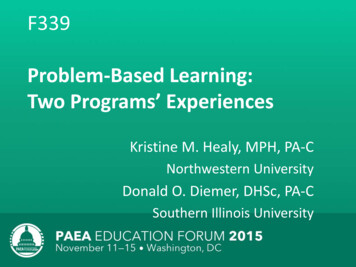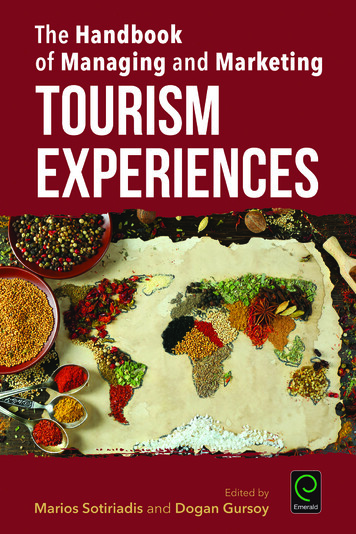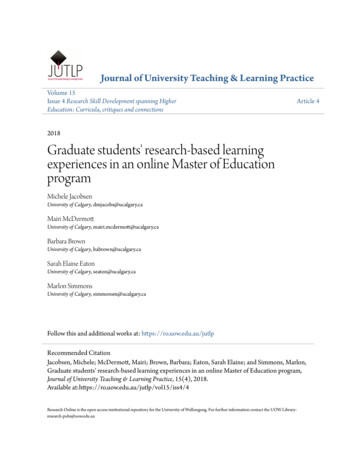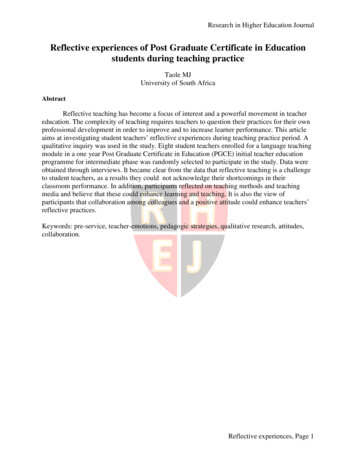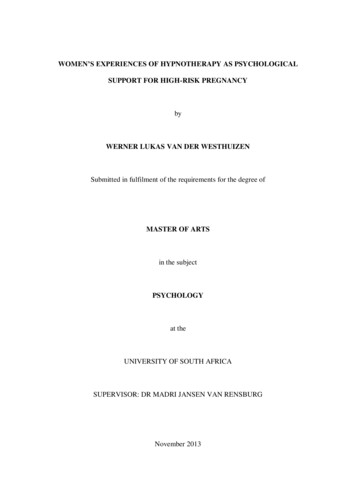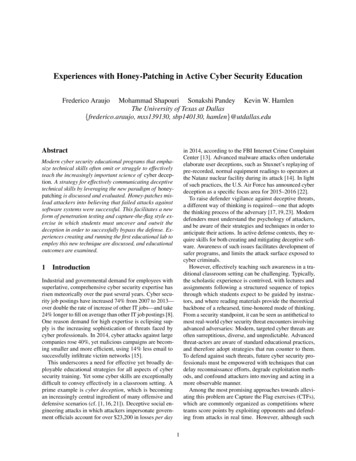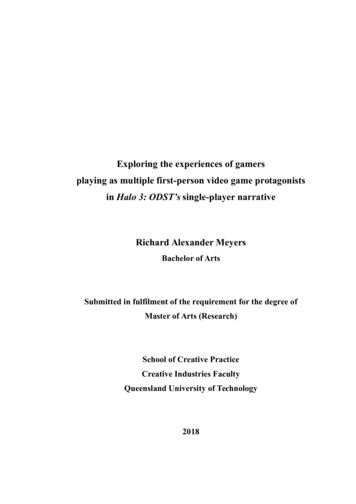
Transcription
Exploring the experiences of gamersplaying as multiple first-person video game protagonistsin Halo 3: ODST’s single-player narrativeRichard Alexander MeyersBachelor of ArtsSubmitted in fulfilment of the requirement for the degree ofMaster of Arts (Research)School of Creative PracticeCreative Industries FacultyQueensland University of Technology2018
KeywordsFirst-Person Shooter (FPS), Halo 3: ODST, Interpretive Phenomenological Analysis(IPA), ludus, paidia, phenomenology, video games.i
AbstractThis thesis explores the experiences of gamers playing as multiple first-person videogame protagonists in Halo 3: ODST, with a view to formulating an understanding ofplayer experience for the benefit of video game theorists and industry developers. Asignificant number of contemporary console-based video games are coming to becharacterised by multiple playable characters within a game’s narrative. Theexperience of playing as more than one video game character in a single narrativehas been identified as an under-explored area in the academic literature to date.An empirical research study was conducted to explore the experiences of asmall group of gamers playing through Halo 3: ODST’s single-player narrative.Interpretive Phenomenological Analysis (IPA) was used as a methodologyparticularly suited to exploring a new or unexplored area of research and one whichprovides a nuanced understanding of a small number of people experiencing aphenomenon such as, in this case, playing a video game. Data were gathered fromthree participants through experience journals and subsequently through two semistructured interviews.The findings in relation to participants’ experiences of Halo 3: ODST’snarrative were able to be categorised into three interrelated narrative elements: visualimagery and world-building, sound and music, and character. Within these categoriesthere were a number of convergent and divergent themes that provided acontextualised understanding of the multi-character experience. The findings alsoprovided an understanding of the roles of paidia and ludus – two long-standingtheoretical constructs – in the gameplay. This research may serve to benefit videogame developers and contribute to an understanding of the player experience fromthe perspective of gamers themselves.ii
Table of ContentsKeywords.iAbstract.iiTable of Contents.iiiGlossary of Terms.viStatement of Original Authorship.viiiAcknowledgements.ixChapter One: Introduction.11.1 Rationale for the Study.11.2 Methodology.21.3 Thesis Overview.3Chapter Two: Video Game Narrative.42.1 The Field of Video Game Research.42.1.1 Video game research into narrative and character.42.1.2 The roles of narrative and character in video games.62.1.3 The evolution of video games.72.1.4 Narratology and Ludology.82.1.5 The roles of paidia and ludus in video games.92.2 Video Game Narrative Elements.112.2.1 Visual imagery and world-building.122.2.2 Music and sound.122.2.3 Character.132.3 Defining Contemporary FPS Games.132.4 The Entertainment Value of FPS Games.142.4.1 Engagement.152.4.2 Immersion.152.4.3 Identification.162.4.4 Enjoyment.172.5 Research Context.182.5.1 Gameplay and cinematics.182.5.2 Halo, a transmedia franchise.192.5.3 Halo 3: ODST.19Chapter Three: Halo 3: ODST.203.1 Narrative Evolved.203.2 Halo 3: ODST’s Narrative Context.213.3 Creating A Different Halo.223.3.1 Visual imagery and world-building.243.3.2 Sound and Music.253.3.3 Character.263.4 Paidia and Ludus in Halo 3: ODST.273.5 Research Questions.28Chapter Four: Methodology.294.1 The Approach to Inquiry.29iii
4.2 Interpretive Phenomenological Analysis (IPA).304.3 The Use of IPA in Video Game Research.314.4 The Selection of Participants.314.5 Ethical Considerations.344.6 Quality and Validity.354.7 Data Collection.364.7.1 The experience journal.364.7.2 The interview questions.374.7.3 Data preparation.384.8 The Hermeneutic Process.38Chapter Five: The Single-player Narrative Experience.415.1 Essence of the Experience.415.1.1 An immersive noir narrative.425.1.2 Non-linear episodic narrative style.435.1.3 Multiple playable characters.435.2 The Player Experience of Visual Imagery and World-building.445.2.1 The desire for discovery and exploration.455.2.2 The highs and lows of navigation.465.2.3 Nostalgia through intertextuality.475.2.4 Analepsis.485.2.5 Player suggestions for improvement.495.3 The Player Experience of Sound and Music.505.3.1 Silenced weapons and the implication of stealth.515.3.2 Atmosphere and all that jazz.525.3.3 Audio-logs and embedded narrative.535.3.4 Player suggestions for improvement.545.4 The Player Experience of Character.555.4.1 The Rookie and the self.555.4.2 Edward Buck a.k.a. Nathan Fillion.575.4.3 No-one likes the Captain.585.4.4 Player suggestions for improvement.595.5 Discussion.595.5.1 Visual imagery and world-building.605.5.2 Sound and music.615.5.3 Character.62Chapter Six: The Gameplay Experience and the Roles of Paidia and Ludus.656.1 The Player Experience of Gameplay.656.1.1 Narrative immersion through movie moments.656.1.2 Different character, same armour.676.1.3 Walk, shoot, clue, repeat.686.2 The Roles of Paidia and Ludus.696.2.1 Paidia in the streets.706.2.2 Ludus in the flashbacks.726.2.3 Too much ludus in my paidia.726.3 Discussion.736.3.1 The Experience of gameplay.736.3.2 Paidia.756.3.3 Ludus.766.3.4 Paidia and ludus.76iv
Chapter Seven: Summary and Conclusions.787.1 An Overview of the Findings.787.1.1 Essence of the experience.787.1.2 The experience of Halo 3: ODST’s narrative.797.1.3 The experience of Halo 3: ODST’s gameplay.817.1.4 Participant’s personal suggestions for improvement.827.1.5 The strengths and limitations of the study.837.2 Implications for Video Game Design.847.2.1 The only difference between premise and story is the dose.847.2.2 He doesn’t talk much.857.3 Recommendations for Further Research.857.3.1 Phenomenological analysis of video game narratives.867.3.2 Multiple playable protagonists.867.3.3 Paidia and ludus in one game.867.4 Conclusions.87Appendices.89Appendix A: Ethics Approval Certificate.89Appendix B: Participant Information Sheet.90Appendix C: Participant Consent Form.
RPG: Role Playing Game; a game genre that involves players increasing their character’s skills and customising their character’s appearance while they overcome increasingly difficult challenges. Transmedia franchise: a narrative series that is available across multiple media such as books, television and video games. Video game console: a technological platform specifically designed for .
